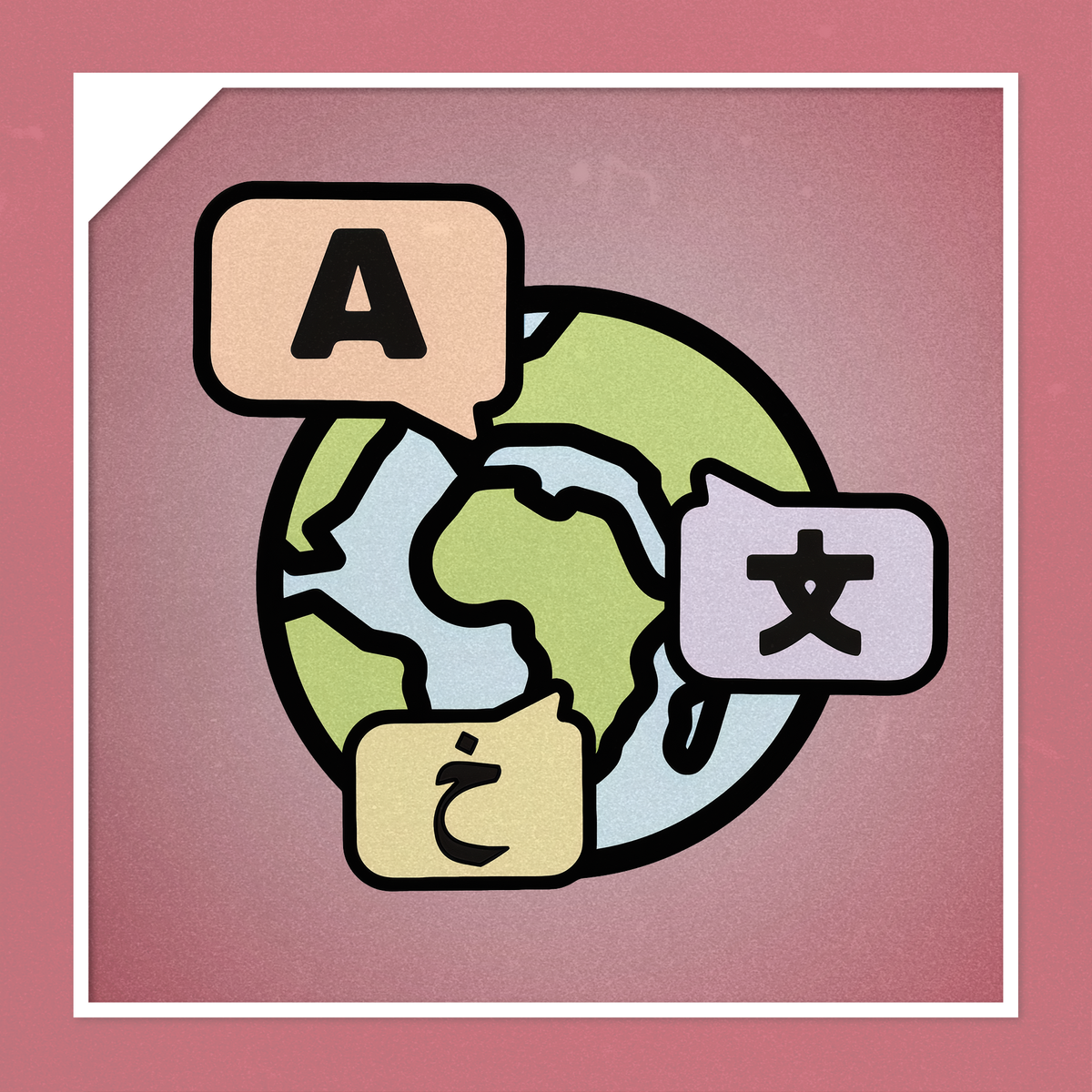Linguist
A Career as a Linguist: Understanding Language, Shaping Communication
Linguistics is the scientific study of language, exploring its structure, use, and evolution. Linguists delve into the intricate systems that underpin human communication, from the smallest sounds to the complex rules governing sentence formation and meaning. It's a field that combines analytical rigor with a deep curiosity about one of humanity's most fundamental characteristics.
Working as a linguist offers the chance to unravel the mysteries of how we communicate, preserve endangered languages, or even help develop the technologies that power voice assistants and machine translation. It's a career path that can lead to diverse settings, from university research labs and fieldwork in remote communities to roles in tech companies, government agencies, and educational institutions. Exploring the patterns, sounds, and social contexts of language provides a unique lens through which to understand human cognition and culture.
Introduction to Linguistics as a Career
Embarking on a career in linguistics means dedicating yourself to the systematic investigation of language in all its forms. It involves analyzing not just words and grammar, but also the sounds, meanings, social contexts, and cognitive processes related to language.
What is Linguistics?
Linguistics seeks to understand the fundamental principles governing language structure and use. It examines how languages are organized, how they change over time, how children acquire them, and how they are processed in the human brain. Linguists approach language scientifically, developing theories and testing hypotheses based on empirical evidence drawn from diverse languages around the world.
The field is vast, encompassing everything from the physical properties of speech sounds (phonetics) to the rules of sentence structure (syntax) and the interpretation of meaning (semantics). It also explores how language varies across social groups (sociolinguistics) and how it interacts with psychological processes (psycholinguistics). This breadth allows for specialization while demanding a holistic understanding of language phenomena.
This introductory course provides a broad overview of the field, touching upon many facets of human language and featuring insights from leading linguists.
Understanding the core concepts requires familiarity with the building blocks of language analysis.
Theoretical vs. Applied Linguistics
A key distinction within the field lies between theoretical and applied linguistics. Theoretical linguistics focuses on developing models and theories about the underlying structures and principles common to all languages. Subfields like phonology, syntax, and semantics fall primarily under this umbrella, aiming to uncover universal linguistic patterns.
Applied linguistics, conversely, utilizes linguistic theories and methods to address real-world problems. This includes areas like second language acquisition, language teaching, translation, speech therapy, forensic linguistics (using linguistic evidence in legal contexts), and computational linguistics (developing language technologies). While distinct, these branches often inform each other, with theoretical insights driving practical applications and real-world data refining theories.
Many linguists find themselves working at the intersection of theory and application, bridging fundamental research with practical challenges in communication, education, and technology.
Common Misconceptions
One prevalent misconception is that linguists are polyglots who fluently speak many languages. While many linguists are passionate about languages and may speak several, the primary focus is on analyzing language structure and use, not necessarily achieving fluency in numerous tongues. A linguist studying Navajo, for example, needs to understand its grammatical system deeply but may not be a conversational speaker.
Another misunderstanding is confusing linguistics with prescriptive grammar – the rules taught in school about "correct" usage (e.g., "don't end a sentence with a preposition"). Linguistics is descriptive; it aims to describe how people actually use language, without making value judgments about correctness. Linguists study language variations and dialects as valid systems in their own right.
Finally, linguistics is often thought to be solely focused on literature or rhetoric. While language is central to these fields, linguistics adopts a scientific approach, analyzing language data systematically to understand its underlying cognitive and social mechanisms.
These foundational books offer clear introductions to the scope and methods of contemporary linguistics, helping to dispel common myths.
A Brief History
The systematic study of language dates back thousands of years, with ancient Indian grammarians like Pāṇini providing incredibly detailed analyses of Sanskrit structure around the 4th century BCE. In the Western tradition, Greek philosophers debated the nature of language, and Roman scholars documented Latin grammar.
Modern linguistics emerged in the late 19th and early 20th centuries, shifting towards a more scientific and descriptive approach. Key figures like Ferdinand de Saussure emphasized the structural nature of language as a system of signs. The mid-20th century saw the "cognitive revolution," heavily influenced by Noam Chomsky, who proposed innate linguistic structures (Universal Grammar) and focused on syntax as central to understanding language.
Since then, the field has diversified significantly, incorporating insights from psychology, sociology, computer science, and neuroscience. Today, linguistics continues to evolve, tackling complex questions about language diversity, change, acquisition, and its role in shaping human thought and interaction.
This book explores the fascinating history and global spread of languages, providing context for the field's development.
Core Areas of Linguistic Study
Linguistics is divided into several core subfields, each focusing on different aspects of language structure and use. Understanding these areas provides a map of the diverse landscape linguists explore.
Phonetics and Phonology
Phonetics is the study of speech sounds – their physical production (articulatory phonetics), acoustic properties (acoustic phonetics), and perception (auditory phonetics). Phoneticians analyze the inventory of sounds used in different languages and how they are articulated using the vocal tract.
Phonology, closely related, studies how sounds function within a specific language system. It examines which sound differences are meaningful (phonemes) and how sounds interact and pattern (e.g., rules governing pronunciation changes in different contexts). For example, phonology explains why the 'p' sounds in "pin" and "spin" are physically different (aspirated vs. unaspirated) but perceived as the same phoneme /p/ by English speakers.
These fields are crucial for understanding pronunciation, dialect variation, language acquisition, and developing speech technologies. Practical applications include speech therapy, accent reduction training, and designing speech recognition software.
Syntax and Semantics
Syntax is the study of sentence structure – the rules governing how words combine to form phrases and sentences. Syntacticians analyze grammatical relationships, word order, and hierarchical structures to understand how languages build meaning through arrangement. Why does "The cat chased the mouse" mean something different from "The mouse chased the cat"? Syntax provides the framework to answer such questions.
Semantics focuses on meaning – how words, phrases, and sentences convey meaning, and how context influences interpretation. It explores concepts like word sense, ambiguity, entailment (what logically follows from a statement), and presupposition (what is assumed). Semantics bridges linguistics with logic and philosophy.
Together, syntax and semantics are fundamental to understanding grammar, interpretation, and how language encodes complex thoughts. They are vital for natural language processing, translation, and language education.
These foundational texts delve into the principles governing sentence structure and meaning.
Sociolinguistics
Sociolinguistics examines the relationship between language and society. It investigates how language use varies based on factors like social class, ethnicity, gender, age, and geographical region. Sociolinguists study dialects, accents, code-switching (alternating between languages or dialects), and how language reflects and reinforces social identities and power structures.
This field explores questions like: Why do different groups of people speak differently? How does language change spread through communities? How do social attitudes towards language varieties affect speakers? Research often involves fieldwork, collecting and analyzing language data from real-world interactions.
Sociolinguistics has important implications for education, language policy, intercultural communication, and understanding social dynamics. It highlights that language is not just a cognitive system but also a deeply social practice.
Understanding linguistic diversity is central to sociolinguistics. This course explores the implications and management of diverse language contexts.
These books examine how language interacts with social identity and gender.
Computational Linguistics
Computational linguistics sits at the intersection of linguistics and computer science. It involves using computational methods to model and analyze language, and developing technologies that can process, understand, or generate human language. This field powers applications like machine translation, search engines, spell checkers, sentiment analysis, chatbots, and voice assistants.
Practitioners often work with large datasets (corpora) and employ techniques from Natural Language Processing (NLP), machine learning, and artificial intelligence. Key tasks include parsing (analyzing sentence structure), part-of-speech tagging, named entity recognition, and word sense disambiguation.
The demand for computational linguists has surged with the rise of AI and big data. It requires a strong foundation in linguistic principles combined with programming skills and familiarity with statistical methods.
These courses introduce computational approaches to language, including NLP techniques and specific models like BERT.
Psycholinguistics
Psycholinguistics explores the relationship between language and the mind. It investigates the cognitive processes involved in language comprehension, production, and acquisition. Psycholinguists study how humans perceive sounds, access words from their mental lexicon, construct sentences in real-time, and understand meaning during conversation.
Research methods often involve experiments measuring reaction times, eye-tracking during reading, and brain imaging techniques (like fMRI or EEG) to observe neural activity related to language processing. Key areas include first and second language acquisition, bilingualism, language disorders (like aphasia), and the connection between language and thought.
Psycholinguistics provides insights into how language is represented and processed in the brain, informing fields like education, speech therapy, and artificial intelligence research aimed at creating more human-like language models.
This course explores the cognitive aspects of language and thought.
Understanding how second languages are learned is a key area of psycholinguistics.
Linguist Roles and Responsibilities
The work of a linguist varies significantly depending on the sector and specialization. Roles can range from theoretical research in academia to practical applications in technology, government, or education.
Academic vs. Corporate Linguistics Roles
Academic linguists, typically employed by universities, focus on research and teaching. Their responsibilities include conducting original research, publishing findings in peer-reviewed journals, presenting at conferences, teaching undergraduate and graduate courses, mentoring students, and contributing to departmental administration. Research often involves deep theoretical analysis or empirical studies within a specific subfield.
Corporate linguists work in industry, applying linguistic knowledge to business challenges. Common employers include tech companies (developing NLP applications, improving user interfaces, analyzing user data), consulting firms, marketing agencies (analyzing brand language, consumer responses), and publishing houses. Roles might involve data analysis, software development, user experience (UX) research, localization, or terminology management.
While academic roles often require a PhD, corporate positions may be accessible with a Master's or even a Bachelor's degree, particularly if combined with relevant technical skills (like programming) or domain expertise. The day-to-day work differs significantly: academic roles emphasize long-term research projects, while corporate roles often involve faster-paced, project-based work driven by business objectives.
Fieldwork and Data Collection
For many linguists, particularly those in descriptive linguistics, sociolinguistics, or language documentation, fieldwork is essential. This involves traveling to communities, often in remote locations, to collect primary language data directly from speakers. Methods include recording conversations, eliciting specific grammatical structures, conducting interviews, and participant observation.
Fieldwork requires careful planning, cultural sensitivity, and ethical considerations, especially when working with minority or endangered language communities. Linguists must build trust with speakers, obtain informed consent, and manage data responsibly. The goal is to gather authentic language samples that accurately reflect natural usage.
Data collection can also occur in laboratory settings (e.g., psycholinguistic experiments) or through analyzing existing text corpora or digital communication. The method depends heavily on the research question and subfield.
This course, while focused on anthropology, touches upon methods relevant to cultural and linguistic fieldwork.
Language Documentation Processes
Language documentation is a critical area, especially given the alarming rate at which languages are disappearing globally. It involves creating a comprehensive record of a language, including its grammar, lexicon, and cultural contexts of use. This goes beyond simple description to create a lasting resource for both the speech community and future researchers.
The process typically includes making high-quality audio and video recordings of diverse speech genres (stories, conversations, songs, rituals), transcribing and translating these recordings, compiling dictionaries, and writing grammatical descriptions. Linguists often collaborate closely with community members, training them in documentation techniques and ensuring the materials produced are accessible and useful to them.
Ethical considerations are paramount, focusing on intellectual property rights, data ownership, and supporting community efforts towards language maintenance or revitalization.
These courses touch upon endangered languages and the importance of cultural context, relevant to documentation efforts.
Tools and Technologies Used
Linguists utilize a variety of tools depending on their specialization. Phoneticians use software like Praat for acoustic analysis and software for articulatory tracking. Syntacticians might use specialized software for drawing tree diagrams or analyzing grammatical structures.
Corpus linguistics relies heavily on software for searching and analyzing large text databases (corpora), such as AntConc or Sketch Engine. Computational linguists use programming languages like Python extensively, along with libraries like NLTK, spaCy, and frameworks like TensorFlow or PyTorch for building NLP models.
Field linguists use high-quality audio/video recorders, transcription software (like ELAN), and database tools for managing lexical data (like FLEx). Statistical software (e.g., R) is increasingly important across subfields for analyzing quantitative data.
Familiarity with relevant tools is crucial for efficiency and employability, especially in applied and computational roles. Many of these skills can be developed through formal education, workshops, and online courses available through platforms found on OpenCourser.
This course introduces text analysis using computational tools.
This book provides a foundational understanding of grammar, essential for utilizing many linguistic tools effectively.
Formal Education Pathways for Aspiring Linguists
Pursuing a career in linguistics typically involves formal academic training. The specific path depends on career goals, whether aiming for academic research, industry roles, or related professions.
Undergraduate Degree Requirements
A Bachelor's degree in Linguistics (or a related field like Cognitive Science, Anthropology, or a specific language) is usually the first step. Undergraduate programs provide a broad foundation, covering core areas like phonetics, phonology, syntax, semantics, and often sociolinguistics or psycholinguistics.
Coursework typically includes introductory surveys, specific subfield courses, language analysis methods, and possibly courses on specific language families or linguistic typology (the study of cross-linguistic variation). Many programs also require or recommend courses in statistics, logic, computer science (especially for computational interests), or related disciplines.
Strong analytical skills, attention to detail, and the ability to work with abstract systems are essential. Developing research skills through undergraduate theses or assisting faculty research can be highly beneficial for graduate school aspirations.
These courses offer introductions suitable for those exploring linguistics at the undergraduate level or earlier.
Graduate Program Specializations
For research-focused careers or many specialized industry roles, a graduate degree (Master's or PhD) is often necessary. Graduate programs allow for deep specialization within a chosen subfield. Common specializations include theoretical areas (phonology, syntax, semantics), sociolinguistics, psycholinguistics, historical linguistics, language acquisition, or computational linguistics/NLP.
Master's programs (typically 1-2 years) provide advanced coursework and research experience, often serving as a stepping stone to a PhD or preparation for specific industry roles (e.g., TESOL, computational linguistics). PhD programs (typically 4-6 years or longer) are research-intensive, culminating in a dissertation that makes an original contribution to the field. Admission to graduate programs, especially top PhD programs, is competitive, requiring strong academic records, research potential (often demonstrated through writing samples), and letters of recommendation.
Choosing a program involves considering faculty expertise aligning with your interests, program structure, funding opportunities, and career placement records.
This book covers advanced syntactic theory, typical of graduate-level study.
This course explores language change, a common graduate specialization.
PhD Research Expectations
A PhD in Linguistics is primarily a research degree. Beyond advanced coursework and comprehensive exams, the core requirement is the doctoral dissertation. This involves identifying a significant research question, designing and conducting original research (which could involve theoretical analysis, experiments, fieldwork, corpus analysis, or computational modeling), and writing a substantial scholarly work presenting the findings.
PhD students work closely with a faculty advisor and committee. They are expected to develop expertise in their chosen specialization, engage with current scholarly literature, and contribute new knowledge to the field. Presenting research at conferences and publishing in academic journals are often expected milestones during the PhD journey.
The process demands intellectual curiosity, persistence, strong analytical and writing skills, and the ability to work independently. A PhD prepares individuals primarily for academic careers but also equips them with advanced research and analytical skills valued in certain high-level industry roles, particularly in R&D.
This book delves into historical linguistics, a complex area often explored in PhD research.
Key Skills Developed
Linguistics training develops a unique set of transferable skills. Central among these are strong analytical and problem-solving abilities, honed through dissecting complex language data and identifying underlying patterns and rules. Linguists become adept at handling ambiguity and working with abstract systems.
Data analysis skills are crucial, whether dealing with qualitative data from fieldwork or quantitative data from experiments or corpora. This includes systematic data collection, organization, interpretation, and argumentation based on evidence. Communication skills are also vital, involving clear articulation of complex ideas both orally (in presentations, teaching) and in writing (research papers, reports).
Depending on the specialization, students may also develop technical skills (programming, statistical analysis), cross-cultural communication skills (from fieldwork or studying diverse languages), and pedagogical skills (from teaching assistantships). These skills are valuable not only within linguistics but also in a wide range of other careers.
Courses focusing on grammar and style enhance the critical communication skills developed through linguistic study.
Online Learning and Self-Directed Study
While formal degrees provide structured pathways, online learning offers flexible and accessible ways to explore linguistics, acquire specific skills, or supplement traditional education. For career changers or those exploring the field, online resources can be invaluable.
Complementing Formal Education
Online courses can effectively complement formal degree programs. Students can use them to explore subfields not covered extensively in their curriculum, delve deeper into specific topics, or gain practical skills like programming for computational linguistics or specific research methodologies. Platforms like OpenCourser aggregate courses from various providers, making it easier to find relevant material.
For instance, an undergraduate focusing on theoretical syntax might take online courses in Python or corpus analysis to broaden their skillset for future research or industry opportunities. Similarly, online courses on specific language families or endangered languages can supplement university offerings.
Online resources also provide access to lectures and materials from different institutions and experts, offering diverse perspectives and broadening intellectual horizons beyond one's home university.
These courses allow learners to explore specific linguistic areas or languages online.
Building Practical Projects Independently
Online learning often emphasizes practical application. Many courses, particularly in computational linguistics or data analysis, include hands-on projects. Learners can build skills by completing these projects or by initiating their own independent projects.
Examples could include analyzing a small text corpus for linguistic patterns, building a simple chatbot, creating visualizations of dialectal variations using online data, or attempting to document aspects of a local dialect or heritage language. These projects serve as tangible demonstrations of skills and understanding, which can be valuable additions to a resume or portfolio, especially for those transitioning into applied roles.
Engaging in online communities, forums, or open-source projects related to linguistics or NLP can also provide opportunities for collaborative learning and practical experience.
This project-based course provides hands-on experience in a specific NLP task.
Certifications vs. Skill Demonstration
Many online courses offer certificates upon completion. While these can signal initiative and completion of coursework, their value in the job market varies. For established academic paths (like PhD admissions), formal degree credentials remain paramount.
In industry, particularly in tech-related linguistic roles, demonstrated skills often carry more weight than certificates alone. A strong portfolio showcasing practical projects (e.g., code repositories on GitHub, project write-ups) or contributions to relevant open-source initiatives can be more compelling to employers than a list of online course certificates.
Certificates can be useful additions to a resume, especially when transitioning careers, but they should ideally be backed by tangible evidence of acquired skills and the ability to apply them to real problems. Focus on learning the material deeply and applying it through projects rather than solely collecting certificates. OpenCourser's Learner's Guide offers tips on effectively using online courses for skill development and career advancement.
Limitations of Purely Online Pathways
While online learning offers significant benefits, a purely online pathway into linguistics, especially for research-focused or highly specialized roles, has limitations. Formal degree programs provide structured curricula, direct interaction with faculty experts, mentorship opportunities, access to institutional resources (libraries, labs), and established credentialing.
The interactive, seminar-style learning common in graduate programs, crucial for developing advanced critical thinking and research skills, can be difficult to replicate fully online. Networking opportunities and the development of a scholarly community are also key aspects of traditional academic pathways.
For those aiming for roles requiring deep theoretical knowledge or advanced research capabilities, online learning is best viewed as a powerful supplement or preparatory step, rather than a complete substitute for formal graduate education. However, for certain applied roles or for personal enrichment, online resources can provide substantial and sufficient learning opportunities.
This comprehensive introduction provides a strong foundation, whether pursued online or in person.
Career Progression for Linguists
The career trajectory for a linguist can follow several paths, depending on whether they pursue academia, industry, government, or related fields. Advancement often involves gaining specialized expertise and taking on greater responsibilities.
Entry-Level Positions
With a Bachelor's degree, entry-level opportunities might include roles like research assistant in a university lab, editorial assistant at a publishing house, data annotator for NLP projects, or positions in language education support. Some might find roles in marketing or communications where analytical skills are valued.
A Master's degree opens doors to more specialized roles, such as computational linguist at a tech company (often requiring programming skills), language analyst for government agencies, curriculum developer for language programs, or speech-language pathology assistant (requiring specific certification).
Entry-level academic positions typically require a PhD, starting with postdoctoral research fellowships or visiting assistant professorships, which involve research and some teaching.
Developing strong vocabulary and grammar skills is fundamental for many entry-level roles.
Mid-Career Specialization Options
As linguists gain experience, they often specialize further. In academia, this means developing a focused research program within a subfield, potentially leading to tenure as an associate professor. Responsibilities expand to include more significant research projects, graduate student supervision, and potentially administrative roles.
In industry, mid-career linguists might become senior computational linguists, NLP engineers, UX researchers specializing in language, product managers for language technologies, or senior data scientists focusing on linguistic data. Specialization might involve mastering specific technologies (e.g., deep learning for NLP), methodologies (e.g., advanced corpus analysis), or application domains (e.g., healthcare informatics, financial text analysis).
Government roles might involve becoming senior intelligence analysts, language policy advisors, or specialists in forensic linguistics. Mid-career progression often involves leading projects, mentoring junior colleagues, and developing strategic expertise.
This book covers discourse analysis, a potential area for mid-career specialization.
Exploring specific language structures, like Japanese, can be a specialization path.
Leadership Roles in Academia and Industry
Senior linguists can move into leadership positions. In academia, this includes becoming a full professor, department chair, dean, or director of a research center. These roles involve significant administrative responsibilities, strategic planning, faculty management, and representing the discipline within the university and externally.
In industry, leadership roles might include principal scientist, research director, head of NLP/AI, director of localization, or senior manager overseeing language-related teams or products. These positions require strong technical or domain expertise combined with management skills, strategic vision, and the ability to lead large projects or teams.
Leadership roles in both sectors often involve shaping research directions, setting organizational strategy, managing budgets, and mentoring the next generation of linguists.
Alternative Career Paths Using Linguistic Skills
The analytical, problem-solving, and communication skills honed in linguistics are transferable to a wide range of careers outside traditional linguistic roles. Many linguists pivot into related fields or entirely different sectors.
Common alternative paths include technical writing, editing, publishing, library science, information architecture, user experience (UX) design, market research, brand strategy, data analysis in non-linguistic domains, translation and interpretation, and teaching ( K-12 or language instruction). Forensic linguistics offers a niche path combining language analysis with legal contexts.
For those considering a change, reflecting on specific skills gained (e.g., data analysis, cross-cultural communication, pattern recognition) and how they apply to other fields is key. Online courses or further training might facilitate transitions into roles like Data Science or technical communication.
These careers directly utilize or benefit significantly from linguistic training.
Linguist in the Modern Workforce
The role and demand for linguists are evolving rapidly, influenced by technological advancements, globalization, and changing societal needs. Understanding these trends is crucial for career planning.
Impact of AI and NLP
The explosion of Artificial Intelligence (AI) and Natural Language Processing (NLP) has profoundly impacted linguistics. While creating new opportunities, particularly in computational linguistics, it also raises questions about the future of certain roles. Demand has surged for linguists who can design, train, and evaluate language models, improve human-computer interaction, and analyze vast amounts of text data.
However, AI advancements, especially in machine translation and text generation, may automate tasks previously performed by human linguists, translators, or content creators. This underscores the need for linguists to develop complementary skills, such as computational expertise, critical evaluation of AI outputs, understanding ethical implications, or focusing on uniquely human aspects of language like nuanced meaning, cultural context, and creativity.
The U.S. Bureau of Labor Statistics projects growth in related fields like translation and interpretation, but notes that technology significantly impacts the work. Staying adaptable and continuously learning are key. According to BLS data, employment for interpreters and translators is projected to grow, but technology will continue to shape the profession.
These courses explore the intersection of language, AI, and related technologies.
Government vs. Private Sector Demand
Linguists find opportunities in both government and the private sector. Government agencies (e.g., intelligence agencies like the CIA or NSA, the State Department, the military, law enforcement) hire linguists for roles in translation, interpretation, language analysis, cryptography, and cultural advising. Security clearances are often required, and proficiency in critical or strategic languages is highly valued.
The private sector, particularly the tech industry, employs a large number of linguists, primarily in computational roles (NLP engineers, data scientists, researchers) working on search engines, voice assistants, machine translation, and AI development. Other private sector opportunities exist in education technology, publishing, marketing, consulting, and localization services.
Demand fluctuates based on geopolitical events (for government roles) and technological trends (for private sector roles). Salaries and work culture can differ significantly between the two sectors.
Globalization and Language Services
Increasing globalization drives demand for language services, including translation, interpretation, and localization (adapting products or content for specific cultural and linguistic markets). Businesses expanding internationally need linguists to ensure effective communication and culturally appropriate products.
While machine translation improves, human linguists remain essential for high-stakes translation, nuanced interpretation, creative content adaptation (transcreation), and quality assurance. The need for professionals who understand not just language but also cultural context is critical in a globalized world.
This creates opportunities for freelance linguists, language service providers, and in-house localization teams. Understanding intercultural communication is a key asset in this area.
This book explores challenges and strategies in intercultural communication.
These courses cover various languages relevant in a globalized context.
Emerging Specializations
The field of linguistics continues to evolve, leading to new areas of specialization. Forensic linguistics, applying linguistic analysis to legal contexts (e.g., analyzing authorship, interpreting legal language, assessing witness statements), is a growing niche.
Clinical linguistics, focusing on language disorders and their assessment and treatment, overlaps significantly with speech-language pathology. Language technology consulting, advising businesses on implementing NLP solutions or developing language strategies, is another emerging area.
Conservation linguistics or Echolinguistics focuses on the intersection of linguistic diversity and biodiversity, often linked to language documentation and revitalization efforts. As technology and societal needs change, linguists with interdisciplinary skills and adaptability will find new avenues to apply their expertise.
Ethical Considerations in Linguistics
The study and application of linguistics involve unique ethical responsibilities. Linguists often work with sensitive data, vulnerable communities, and technologies with significant societal impact, requiring careful consideration of ethical principles.
Language Preservation Ethics
When working with endangered languages, linguists face ethical dilemmas regarding documentation and revitalization efforts. Key considerations include obtaining free, prior, and informed consent from the community, respecting intellectual property rights, ensuring data is used appropriately and benefits the community, and avoiding extractive practices where researchers benefit more than the speakers.
Collaboration with community members is crucial, empowering them in the documentation process and aligning research goals with community needs and aspirations for language maintenance. Linguists must be mindful of power dynamics and potential impacts of their work on the community's cultural heritage.
These books discuss the challenges and importance of preserving linguistic diversity.
This course delves into policy and implementation for indigenous languages.
Data Privacy in Linguistic Research
Linguistic research often involves collecting personal data, including recordings of speech, text messages, social media posts, or experimental responses. Protecting participant privacy and confidentiality is paramount. This involves anonymizing data where possible, storing data securely, and using it only for the purposes agreed upon during the consent process.
With the rise of large digital corpora and NLP, new privacy challenges emerge regarding the collection and use of publicly available (but potentially sensitive) language data. Linguists must navigate institutional review board (IRB) requirements and adhere to data protection regulations (like GDPR).
Transparency about data usage and potential risks is essential when obtaining informed consent from research participants.
Bias in Language Technologies
AI and NLP systems are trained on vast amounts of language data, which often reflect existing societal biases related to race, gender, socioeconomic status, or other characteristics. This can lead to language technologies that perpetuate or even amplify these biases, resulting in unfair or discriminatory outcomes (e.g., biased hiring algorithms, offensive chatbot responses, unequal performance across dialects).
Computational linguists have an ethical responsibility to be aware of potential biases in data and algorithms, develop methods to detect and mitigate bias, and advocate for fairness and equity in language technology development and deployment. This requires careful consideration of training data, model evaluation metrics, and the potential societal impacts of the technology.
Understanding sociolinguistic variation is crucial for identifying potential sources of bias.
Indigenous Language Revitalization Challenges
Supporting Indigenous language revitalization efforts involves navigating complex ethical and practical challenges. Linguists must work in true partnership with communities, respecting their autonomy, knowledge systems, and goals for language use. This often means adapting traditional linguistic methods to suit community contexts and priorities.
Challenges include addressing the legacy of colonization and linguistic suppression, securing adequate funding and resources, developing appropriate pedagogical materials, training community language teachers, and fostering intergenerational transmission. Linguists involved in revitalization must act as allies and facilitators, prioritizing community leadership and long-term sustainability.
These courses and books highlight the cultural significance and challenges surrounding indigenous and minority languages.
Frequently Asked Questions
Here are answers to some common questions aspiring linguists often have about the field and career prospects.
Do linguists need to speak multiple languages?
No, being a polyglot is not a requirement to be a linguist. While knowledge of other languages can be helpful and often stems from a passion for the subject, the core skill is the ability to analyze language structure and use scientifically. Linguists study the systems underlying language, which doesn't necessitate fluency in every language they analyze. However, specializing in certain areas, like fieldwork on a specific language or translation, may require high proficiency.
How is the career stability in linguistics?
Career stability varies depending on the path chosen. Tenured academic positions offer high stability but are very competitive to obtain. Industry roles, particularly in computational linguistics and NLP, currently experience strong demand and offer good stability, though they are subject to tech sector fluctuations. Government positions often provide good stability once obtained. Freelance work (e.g., translation, consulting) offers flexibility but less inherent stability. Overall, linguists with strong analytical skills, technical proficiency (especially computational), and adaptability tend to have favorable prospects.
How easy is it to transition from linguistics to tech roles?
Transitioning to tech roles, especially in NLP/AI, is a common and often successful path for linguists, but it requires acquiring specific technical skills. A solid understanding of linguistic principles is a valuable asset. However, proficiency in programming (especially Python), data analysis, machine learning concepts, and relevant software tools is usually necessary. Many linguists achieve this transition by pursuing specialized Master's degrees (e.g., in Computational Linguistics), completing bootcamps, or undertaking significant self-study and project work using online resources like those found via OpenCourser searches.
What are the risks and preparations involved in fieldwork?
Linguistic fieldwork, especially in remote or politically sensitive areas, can involve risks. These may include health hazards (diseases, lack of medical facilities), safety concerns (political instability, crime), logistical challenges (difficult travel, basic living conditions), and psychological stress (isolation, cultural adjustment). Preparation involves thorough research of the location, necessary vaccinations and health precautions, safety training, securing research permits and visas, establishing local contacts, having contingency plans, and ensuring adequate funding and insurance. Ethical preparation, including IRB approval and community consultation, is also crucial.
Are there freelance opportunities for linguists?
Yes, there are significant freelance opportunities. Translation and interpretation are common freelance paths. Other possibilities include freelance editing, proofreading, technical writing, linguistic consulting (e.g., advising on brand naming, language technology implementation), data annotation for NLP projects, and curriculum development for language courses. Success in freelancing requires strong self-discipline, marketing skills, business acumen, and building a network of clients.
What is the impact of machine translation on the field?
Machine translation (MT) has dramatically improved, impacting the translation industry and roles within linguistics. While MT can handle routine translation tasks more efficiently, it hasn't eliminated the need for human linguists. Humans are still required for high-quality translation requiring nuance, cultural adaptation (localization), creativity (transcreation), editing MT output (post-editing), and translating sensitive or complex materials. MT has shifted the focus towards skills like quality assurance, localization management, and working collaboratively with technology. It also creates new roles for linguists in developing and improving MT systems themselves.
Helpful Resources
For those interested in exploring linguistics further, several organizations and resources offer valuable information:
- Linguistic Society of America (LSA): https://www.linguisticsociety.org - The major professional organization for linguists in the US, offering resources, publications, and conference information.
- Association for Computational Linguistics (ACL): https://www.aclweb.org - The leading international organization for computational linguistics and NLP, with access to research papers and conference proceedings.
- Ethnologue: Languages of the World: https://www.ethnologue.com - A comprehensive reference cataloging the world's known living languages.
- OpenCourser: https://opencourser.com - Search thousands of online courses, including many in linguistics, language learning, and related fields like Computer Science and Social Sciences. Use the Save to List feature to curate your learning path.
- Bureau of Labor Statistics (BLS) Occupational Outlook Handbook: While lacking a specific "Linguist" category, it provides data on related fields like Interpreters and Translators and Anthropologists.
Exploring a career in linguistics offers a path filled with intellectual discovery and diverse applications. Whether driven by a passion for language structure, cultural understanding, or technological innovation, the field provides numerous avenues to make meaningful contributions. While challenges exist, particularly in competitive academic tracks or the evolving tech landscape, the foundational skills developed in linguistics – rigorous analysis, pattern recognition, and clear communication – are valuable assets in any career. With careful planning, continuous learning, and perhaps leveraging resources like online courses, a rewarding journey in linguistics is achievable.


































